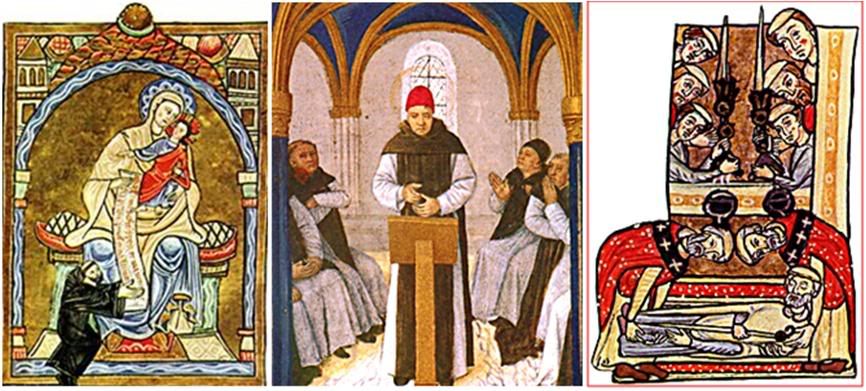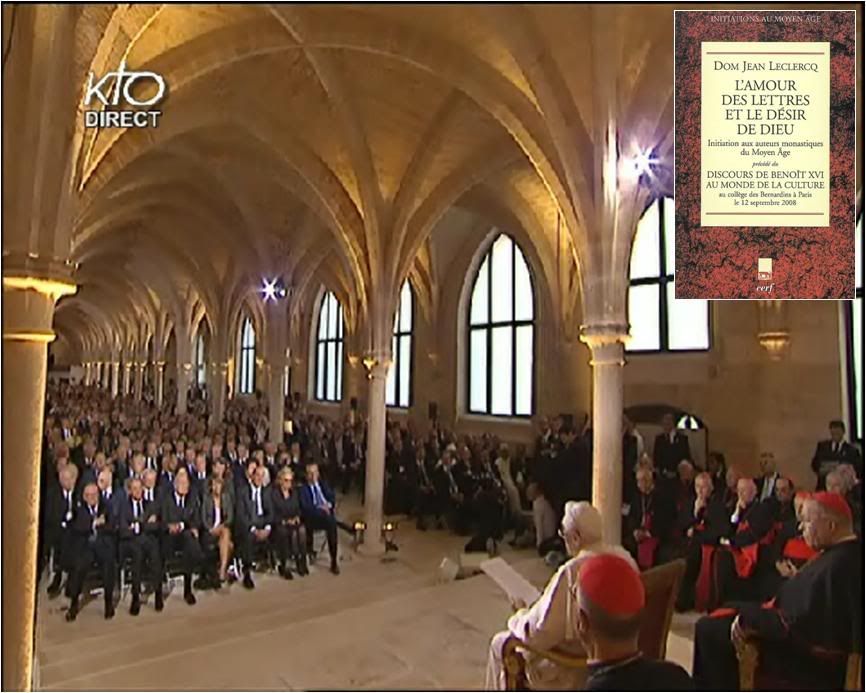 In praise of the medieval Christian thinkers
In praise of the medieval Christian thinkers
In his current catechetical cycle, Benedict XVI has introduced to the public the thought of the great
Christian thinkers who conserved and built on Europe's cultural patrimony in their search for God.
The theologian Pope sees them as models for theologians today.

 OR illustrations of the last 3 papal catecheses. From left, Peter the Venerable; Cistercians listening to Bernard of Clairvaux (inllustrated the 10/28 catechesis); and funeral of Bernard of Clairvaux.
OR illustrations of the last 3 papal catecheses. From left, Peter the Venerable; Cistercians listening to Bernard of Clairvaux (inllustrated the 10/28 catechesis); and funeral of Bernard of Clairvaux.
ROME, November 2, 2009 – At the general audience last Wednesday, Benedict XVI broke away from the pattern of the current cycle. He didn't discuss the figure of a Church Father or a great medieval Christian author, as he has done systematically for a long time. The previous Wednesday, for example, he talked about Saint Bernard of Clairvaux, and the Wednesday before that, about Peter the Venerable, the great abbot of Cluny.
No. This time, Papa Ratzinger's catechesis was a history lesson on theology. He dedicated it entirely to describing twelfth-century Latin theology, which blossomed in the abbeys and cathedrals, and would produce its ripest fruit in the following century, in Saint Thomas Aquinas and Saint Bonaventure of Bagnoregio.
In practice, the written outline of the papal catecheses is prepared by trusted experts with competence in a particular field. Benedict XVI sees the text in advance and enhances it, prunes it, supplements it. In short, he makes it his own. And when he finally reads it to the faithful, he often departs from it even further, improvising. Last winter,
www.chiesa reprinted the five catecheses that the Pope dedicated to Saint Augustine, emphasizing the many passages in which he departed from the written text.
The main expert in this area is Inos Biffi, a medieval theology scholar of rare profundity and with a clear writing style, as can be seen in his imposing bibliography (all his books are being published, in magnificent editions, by Jaca Books).
With him, Benedict XVI is less likely to depart from the written text. The impression is that there is a strong harmony between the Pope and this collaborator, both in thought and in manner of expression.
In the catechesis last Wednesday on the blossoming of theology in the twelfth century, one citation is particularly revealing - a book by a Benedictine scholar of the past century, Jean Leclercq, dedicated to medieval monastic theology and entitled
L’amour des lettres et le désir de Dieu [Love of learning and the Desire for God].
 Benedict XVI at the College des Bernardins. Inset: Leclercq's book has been re-issued with the Pope's lectio magistralis as a Preface.
Benedict XVI at the College des Bernardins. Inset: Leclercq's book has been re-issued with the Pope's lectio magistralis as a Preface.
This book is a favorite of Ratzinger the theologian. As Pope, he cited it in one of the most important speeches of his pontificate, delivered on September 12, 2008, at the Collège des Bernardins in Paris, and addressed to the world of culture.
The greatness of medieval monastic theology, as interpretated by Leclercq, Biffi, and Ratzinger, lies in the connection it makes between the search for God and the study of the word, of language, of literature. The search for God and the culture of the word are one and the same, not only in theology but also in spiritual elevation. And they are at the foundation of European civilization.
But alongside monastic theology, scholastic theology also blossomed in the twelfth century, in the cathedral schools. With a powerful emphasis on reason, on fruitful dialogue between "fides et ratio," between faith and reason.
With this lesson on grand medieval theology, it is as if Benedict XVI - being the Pope theologian that he is - wants to draw the guidelines for the theology of today.
[Magister then provides a translation of the Oct. 28, 2009, catechesis - previously translated and posted on this thread in the preceding page.]
[Modificato da TERESA BENEDETTA 03/11/2009 14:41]